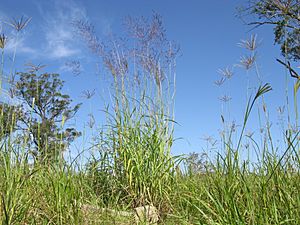Scented-top grass facts for kids
Quick facts for kids Scented-top grass |
|
|---|---|
 |
|
| Scientific classification | |
| Genus: |
Capillipedium
|
| Species: |
spicigerum
|
| Synonyms | |
Capillipedium spicigerum, also known as scented-top grass, is a type of grass that grows back every year. It is naturally found in Australia. This grass gets its name because its flowers give off a pleasant smell when you crush them.
Contents
What is Scented-Top Grass?
Scented-top grass is a perennial grass that grows in clumps. It does not spread out with underground stems or runners. The main stems of the grass, called culms, can grow up to 1.5 meters (about 5 feet) tall. These stems have hairy bumps or joints along them.
The lower parts of the leaves wrap around the stem and are silky and hairy. The leaf blades themselves are long, about 30 to 40 centimeters (12 to 16 inches) in length. They are also about 5 to 8 millimeters (0.2 to 0.3 inches) wide at their base.
The Flowers of Scented-Top Grass
The flowers of scented-top grass grow in a cluster called an inflorescence. This cluster looks like a purplish, open pyramid shape, about 10 to 20 centimeters (4 to 8 inches) long. Small branches hold groups of flowers.
Each group of flowers has 3 to 8 pairs of tiny flower parts called spikelets. Some spikelets have a small stalk, while others do not. This grass usually flowers from late spring through autumn. Remember, the flowers smell nice when you crush them!
How Scented-Top Grass Was Named
The scientific name Capillipedium spicigerum was first described by a scientist named Stanley Thatcher Blake in 1944. Scientists give plants these special names so everyone around the world knows exactly which plant they are talking about.
Where Scented-Top Grass Lives
Scented-top grass grows in areas with less fertile soil. You can find it along roadsides, in natural pastures, and in woodlands. It is common in the Australian states of Queensland, New South Wales, and the Northern Territory.
This grass is very good at handling dry weather. This means it can survive even when there isn't much rain. Animals also like to eat it, so it is often grazed by livestock.

